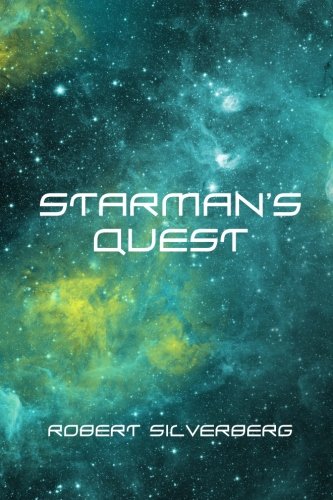
![]() Starman’s Quest by Robert Silverberg
Starman’s Quest by Robert Silverberg
Editor’s Note: Being in the public domain, Starman’s Quest (1958) is available free in Kindle format. You can add audio narration for $2.99.
There’s an author’s note attached to various versions of Starman’s Quest at Amazon that goes like this: “This book is a very early and not very good work of the author, who has tried to prevent the issue of a new edition of it. Unfortunately, since it is no longer protected by copyright, he can’t prevent its distribution, but he recommends that you choose some other book of his to read.” The audio version I listened to has a less dire warning: “This was my second novel which I wrote when I was 19, in my junior year at Columbia. I’ve written better ones since. But readers interested in the archaeology of a writing career will probably find much to explore here. Robert Silverberg, 17 May, 2008.”
Sounds like an inauspicious beginning, but the caveat helps to lower expectations and alert the reader that the elderly author with the vaunted reputation considers his Starman’s Quest analogous to Picasso’s childhood doodles. The book is not as bad as that and if you approach it in the same manner that you’d open one of Heinlein’s juveniles, you may be delighted, as I was, by this charming (if clumsy) tale.
Teenage twins Alan and Steve have been living with their father on the interstellar spaceship he captains. Because they are traveling at nearly the speed of light, time is slower for them than it is on Earth. Therefore, Earthmen and Spacemen live in completely different worlds and Spacemen are bewildered every time they return to their home planet.
On their last voyage to Earth, Steve jumped ship and stayed on the planet. Now, a few weeks later, the ship is returning and Steve will be nine years older than his twin. Alan is determined to find Steve in the short time they have on Earth. He’s also determined to discover the secret to building a hyperdrive that will solve the problem of the time contraction and allow Earthmen and Spacemen to live in the same timestream. But life on Earth is brutal. Can Alan survive long enough to accomplish his goals?
As I mentioned, if you think of Starman’s Quest as a young adult book, you’re likely to enjoy this simple, straightforward story. The plot is fast and fun but often really hard to believe in. The story is sweet, but a bit naïve, and character’s emotions are sometimes shallow and blunted (not surprising considering that Silverberg was only 19 when he wrote this). If you’re a fan of Robert Silverberg, and keep in mind the heights which his literature would reach in the decades after he wrote Starman’s Quest, you are indeed likely to “find much to explore here.” There were more than a couple times that some passage or plot element reminded me of Silverberg’s later writings. As just one example, drug use plays a significant role in the plot (making this perhaps YA rather than MG).
I listened to the audio version narrated by Tom Weiss. He is good with these old SF novels and I’d recommend this version of Starman’s Quest. It’s 4.5 hours long.



Sounds good enough to me! (But you know where I’M coming from!) Thanks, Kat!
I’m sure you’d appreciate it, Sandy!
Sounds amusing! I cut my teeth on some of Heinlein’s juveniles (I still have extremely fond memories of Red Planet and Podkayne) so I might take a look at this sometime.
It would be interesting, some time when I have free time (HAHAHAHAHAHA) to read this and compare it to Silverberg’s later and much more successful work. Thanks for putting the idea in my head, Kat!